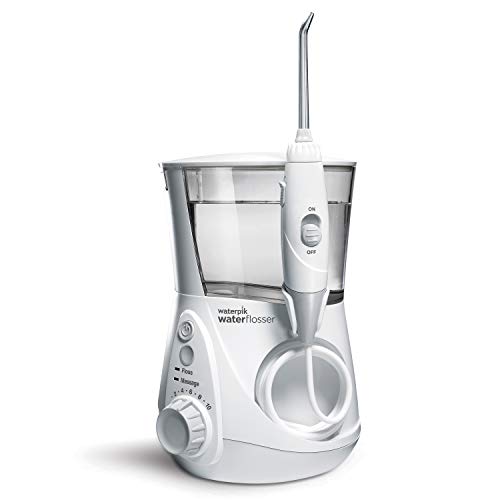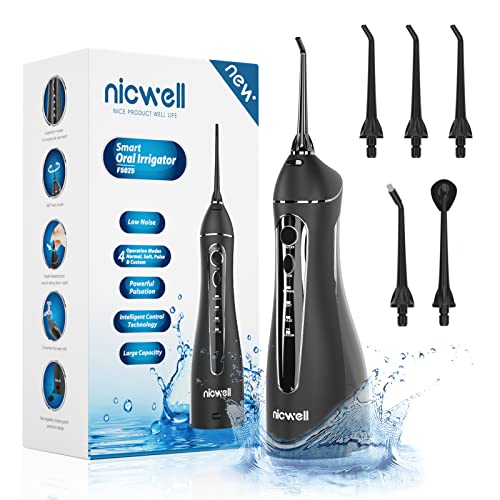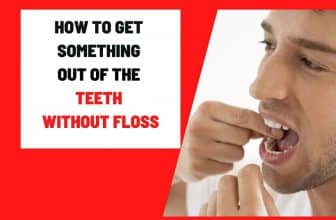
Floss and Water flossers are excellent for cleaning food and debris between teeth, braces, and archwires, particularly under and around permanent (non-removable) bridges. They are also helpful in removing bacterial toxins that have collected in challenging to reach and chronically under-cleaned locations like restorative dentistry, narrow gaps between teeth, or shallower periodontal (gum) pockets.
But can a water flosser replace flossing? Water flossers DO NOT remove plaque (bacterial colonies) as floss does because successful flossing physically “wipes” the sticky plaque off teeth, whereas water flossers can merely “rinse” these regions. Combining flossing and water flossing, on the other hand, can yield fantastic results!
These simple gadgets, often known as oral irrigators or Waterpik, can play an essential part in your dental health regimen. But how do they function? What advantages do they have for your teeth? And can they genuinely take the role of flossing in your dental hygiene routine?
What is Water floss?
WaterPik, Inc. invented the Waterpik® in 1962, which was the first Water Flosser. On their 146th attempt, the business eventually arrived at the optimum design, resulting in the first prototype of their unique oral irrigator. It was commercially marketed by 1967.
Many different water pick designs and brands have since entered the market, providing customers with a beneficial option to maintain their dental health at home.
You Best Water Flosser to replace Floss
How does a water flosser work?
Water picks remove food particles by focusing a stream of water between your teeth. Many versions include variable strength levels, allowing you to adjust how forceful the water spray is, which is very useful if you have sensitive teeth and gums.
Many water flosser devices include a pulsating movement that allows you to focus on the small gaps and cracks between teeth.
Certain studies have proven water flossers to be an effective technique for removing germs from “periodontal pockets,” or the area of your gum line where bacteria commonly collects.
The stream of water from water flossers also aids in the removal of biofilm that accumulates on the teeth, with some studies indicating that water picks can help decrease plaque and calculus when used in conjunction with other dental health therapies.
Water Floss or Dental Floss?
If you’re like most people, flossing feels like a chore that you can quickly tell yourself you don’t need. But you’re mistaken! Flossing every day is essential for preventing plaque development, which leads to tartar.
Plaque removal keeps microorganisms at bay, provides fresh breath, and promotes a healthy mouth.
If you’re considering utilizing a water flosser instead of dental floss, weigh the benefits and drawbacks of each procedure.
Who should use Water floss?
You may opt to use Water Floss instead of floss if you:
- Wear braces
- Have dental implant
- Have non-removable bridgework
- Have crowns
Water Floss: Pros and cons
Pros
- Simple to use
- Cleans between narrowly spaced teeth
- Penetrates into hard-to-reach regions
Cons
- May not remove all plaque
- Expensive
- Messy
Who should use floss?
Everyone should floss their teeth. Flossing is a crucial element of maintaining good oral health and lowering the risk of gum disease and tooth decay.
Flossing: Pros and cons
Pros
- Simple to handle
- Able to clean each tooth completely
Cons
- Your gums may bleed
- Unable to reach certain regions.
Water floss use can be a great alternative to brushing.
People who have dexterity issues or who will never floss can benefit immensely from Water floss use, and it is undoubtedly preferable to doing nothing to clean in between their teeth.
If you are not a flosser and are hesitant to make an effort to floss every day, using water floss is a far superior option to brushing, which does not clean in between your teeth, where most dental disease arises.
Ideally, it would be best to floss at least once every day. If you floss, I recommend flossing first to loosen and remove plaque, then using a Water floss to flush it out.
Last, I recommend using a toothbrush and fluoride toothpaste to clean all exposed regions and administer fluoride topically.
Careful flossing, Water floss usage, and brushing should take around 5 minutes and should be done at night when you are free and will benefit the most from clearing your mouth of food debris and bacteria before bed.
Can a water flosser replace flossing?
Although water picks can be an excellent complement to your dental hygiene routine, they should not be used in place of string flossing.
When used correctly, the string in dental floss helps you to efficiently scrape plaque and remove food particles from the interior surfaces of your teeth.
While the water jet from water floss can help dislodge particles and remove some plaque, it lacks the critical scraping powers of traditional dental floss.
Furthermore, there are several other advantages to using dental floss that you will not find with a water pick:
- Dental floss is exceptionally cheap.
- There is no need for chargers, batteries, or plugs using dental floss.
- Dental floss is portable and easy to transport.
- Dental floss takes up practically no space in your bathroom or kitchen counter.
Replace your Floss with these Cordless Oral Irrigator Water Flosser
Are water flossers as good as floss? Final words
According to the American Dental Association, water flossers with the ADA Seal of Acceptance can remove plaque, and this film hardens into plaque, causing gum diseases and cavities. Some studies, however, have found that water flossers do not remove plaque.
Don’t toss out your old dental floss merely to try something new. Most dentists still believe that flossing on a regular basis is the most significant approach to clean between your teeth.
To eliminate plaque, you scrape up and down the sides of your teeth with the old substance.
Try waxed floss or dental tape if it gets caught in tight spots. If you’re not in the practice of flossing, it may not be easy at first, but it should grow easier.
References
Are water flossers as good as floss? Final words
Waterpiks: Pros and cons
https://www.healthline.com/health/dental-and-oral-health/waterpik-vs-flossing#takeaway












